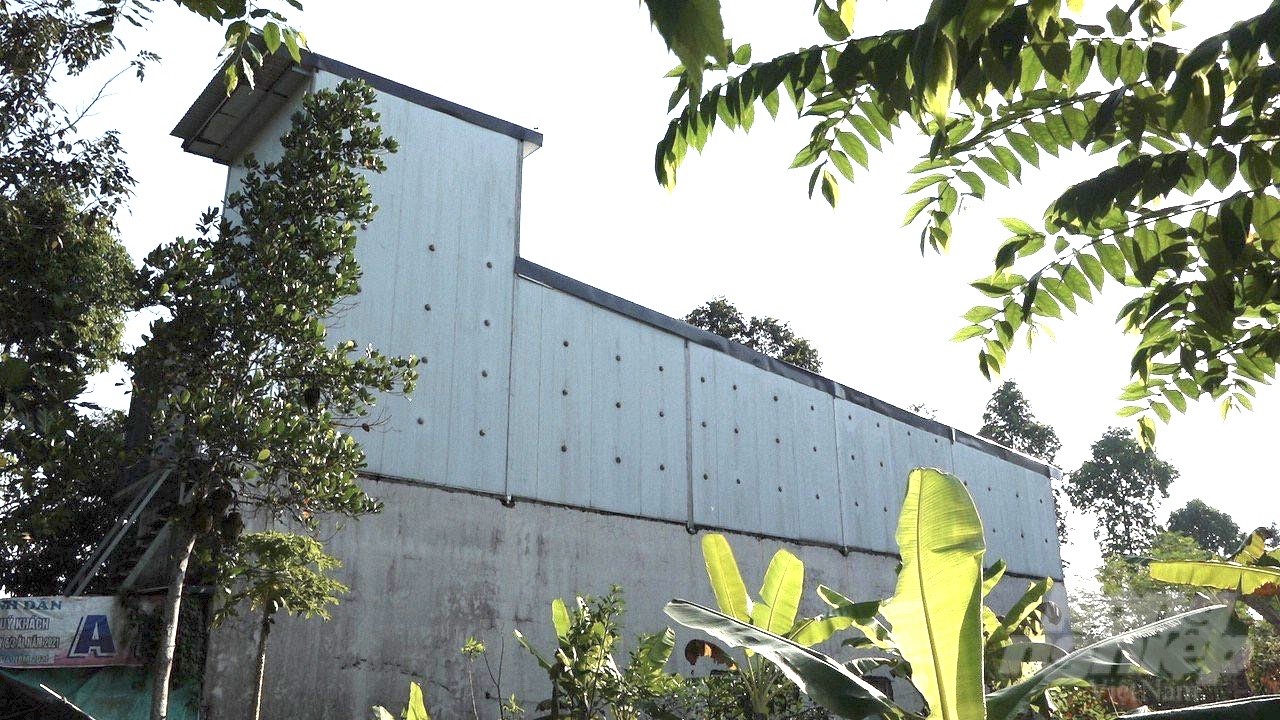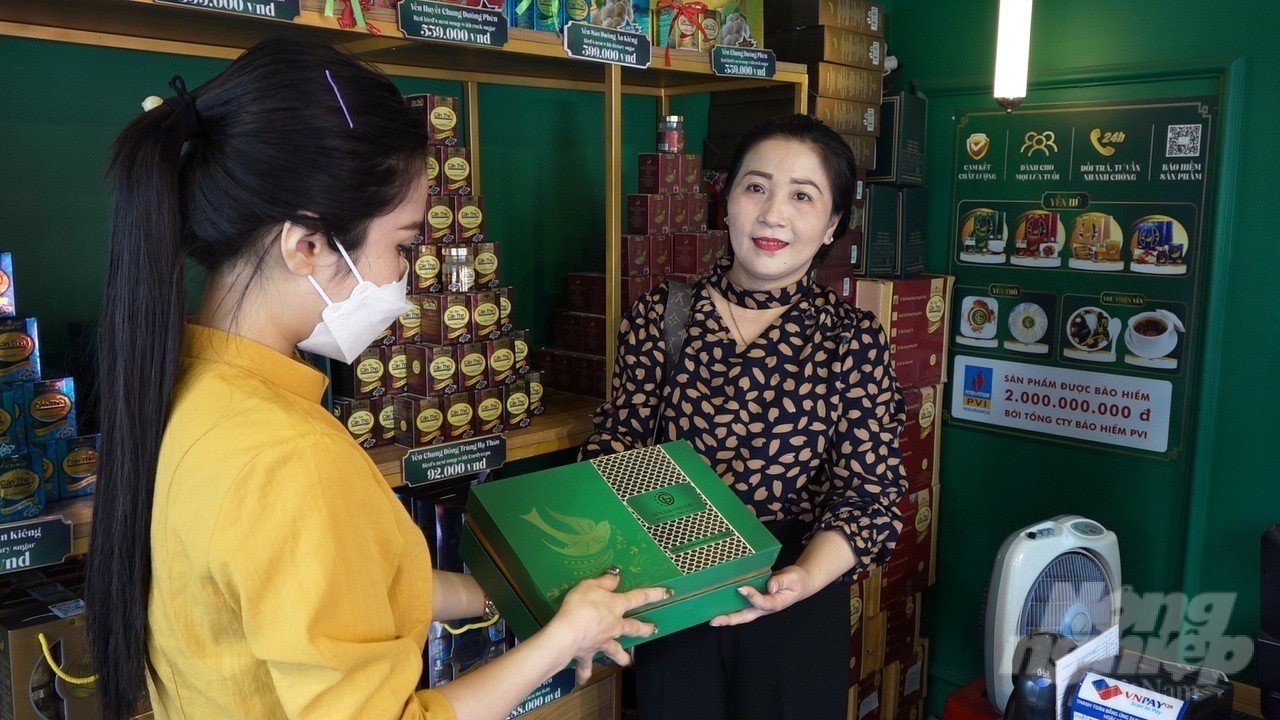June 8, 2025 | 01:40 GMT +7
June 8, 2025 | 01:40 GMT +7
Hotline: 0913.378.918
June 8, 2025 | 01:40 GMT +7
Hotline: 0913.378.918

In recent years, the construction of many new swiftlet houses has increased significantly in the Mekong Delta region, thanks to the attractive economic value that the swiftlet farming industry brings. Photo: Ho Thao.
Swiftlet farming has developed strongly in recent years, and swiftlet houses are considered "white gold mines" with the potential to bring significant profits. A successful swiftlet house can generate hundreds of millions of dongs per year.
The whole country currently has about 24,000 swiftlet farming establishments, with an output of 100 tons of swiftlet nest/year. In Tra Vinh province, a locality with about 628 swiftlet houses and over 500 farming households, people have earned a quite high profit from swiftlet farming without the requirement of food costs.
The price of raw swiftlet's nests after pre-processing fluctuates from VND 18–22 million/kg, even higher according to the season. However, to achieve success in swiftlet farming, farmers need to focus on implementing safe farming measures.
Mr. Nguyen Van Trinh, a swiftlet farmer in cluster 1, Chau Thanh town, Tra Vinh province, shared his experiences in maintaining his swiftlet house. He regularly cleans the swiftlet house twice a month. In particular, clean walls and floors to prevent bacteria and parasites such as pathogenic fungi and mice. He also turns on the speaker at a fixed time to attract swiftlets without negatively affecting his neighbors and, at the same time, to create a habit for swiftlets.
In addition to exploiting swiftlet's nests, Mr. Trinh has taken advantage of swiftlet's droppings to produce soil fertilizers, fungicides, and nematode pesticides, as well as a catalyst in the composting process. This not only brings high economic value but also contributes to the sustainable development of the agriculture sector and environmental protection.
Duyen Hai district is a locality that develops quite quickly in the construction of swiftlet houses, with 28 swiftlet houses in 2018 increasing to 71 at the beginning of 2023. However, there are still many swiftlet farming households that have not yet registered and associated production and processing to optimize economic value.

In addition to exploiting swiftlet’s nests, swiftlet farming also provides a source of fertilizer for crops. This is an efficient way to utilize resources to benefit not only from swiftlet's nests but also from swiftlet's droppings. Photo: Ho Thao.
Mr. Tran Quoc Doan, Head of the Duyen Hai Department of Agriculture and Rural Development, said that despite high profits from swiftlet’s nests, the swiftlet is easily infected with infectious bacterial and parasitic diseases, especially in the rainy season. Therefore, disease monitoring and prevention for swiftlets should be paid attention to.
Swiftlet farmers need to regularly implement sampling and monitoring of the disease situation and, at the same time, comply with environmental hygiene and ensure the supply of good nutrition for swiftlets. The district also encourages enterprises and farming households to associate in processing to increase the economic value of swiftlet nest products.
Currently, according to the Tra Vinh Animal Husbandry and Veterinary Sub-Department, the work of monitoring diseases in swiftlets in the locality is being carried out strictly and regularly. This action’s goal is to detect and promptly handle outbreaks at the farming establishments and, at the same time, ensure food safety at the swiftlet nest processing facilities.
As for swiftlet export enterprises, the work of sampling and monitoring is carried out every six months. After two consecutive samplings, the list of swiftlet houses was reviewed, and the swiftlet houses for the next sampling were randomly selected. During the monitoring process, if sample test results show positive for influenza virus, remedial measures will be taken quickly.
As for swiftlet nest pre-processing and processing establishments, regular inspection of veterinary hygiene and food safety conditions is being carried out effectively. However, disease prevention and food safety assurance still need to be promoted to ensure product quality.
With the high profits that swiftlet farming brings, the important thing is farming properly and complying with the regulations of the local veterinary authority.

Today, swiftlet products are increasingly favored; however, the important thing is to ensure food safety and hygiene to protect consumers' health. Photo: Ho Thao.
Mr. Tran Quoc Viet, Deputy Director of the Tra Vinh Animal Husbandry and Veterinary Sub-Department, said that the agency has offered some important recommendations for swiftlet farmers. First, farmers need to follow strict personal hygiene when contacting swiftlets by using protective gear such as gloves, masks, and coats.
It is important for farmers to regularly monitor the swiftlet's health, recognize unusual symptoms such as loss of feathers, rhinorrhea, etc., and separate the swiftlets with these symptoms to avoid infecting the whole flock. At the same time, effectively control the presence of harmful animals such as dogs, cats, mice, cockroaches, etc.
To ensure that the environment inside the swiftlet’s cage is always clean, it is necessary to disinfect and maintain the environment at a good level. Limit contact with swiftlets from outside sources and implement careful hygiene controls when necessary.
For newly-imported swiftlets or those with pathological symptoms, isolation and close monitoring before blending them into the herd are also important measures. In cases of detecting serious pathological symptoms, farmers should immediately contact the veterinary authority for assistance.
Mr. Tran Quoc Viet, Deputy Director of the Tra Vinh Animal Husbandry and Veterinary Sub-Department, emphasized that sampling and monitoring disease and food safety at swiftlet farming and swiftlet’s nest processing establishments not only ensures the quality of exported products but also contributes to protecting the swiftlet farming industry from diseases and promoting the sustainable development of the animal husbandry.
Translated by Huyen Vu Thu

(VAN) VAAS and numerous Vietnamese enterprises have signed cooperation agreements with Japanese partners to promote agricultural technology and trade connectivity.
/2025/05/29/5625-12-214801_567.jpg)
(VAN) Provincial mergers in the Mekong Delta promise to streamline administration, expand inter-provincial raw material areas, and foster close linkages in agricultural value chains, benefiting both businesses and cooperatives.

(VAN) Merging Mekong Delta provinces contributes to the expansion of agricultural raw material areas, addressing previous constraints caused by provincial boundaries. Additionally, this expansion will reduce costs and strengthen linkages between businesses, cooperatives, and farmers.
/2025/05/29/1043-2-153730_145.jpg)
(VAN) The Government's policy to merge provincial-level administrative units opens up major opportunities for the Mekong Delta region to reshape its agricultural development strategy toward large-scale production, effective regional linkages, and sustainability.

(VAN) The mutual export of agrifood products between the European Union (EU) and the United Kingdom (UK) must occur again without certification, border controls or other red tape. This was agreed at the UK-EU summit.
/2025/05/22/5121-2-173645_677.jpg)
(VAN) NBSAP Tracker identifies strengths and areas for improvement in the National Biodiversity Strategy, based on each region’s priorities and capacities.

(VAN) The draft amendment to the Circular on rice export trading stipulates a periodic reporting regime for rice exporting enterprises.